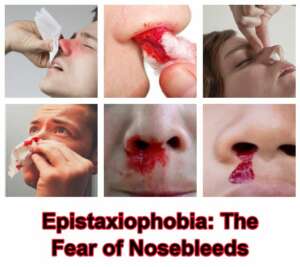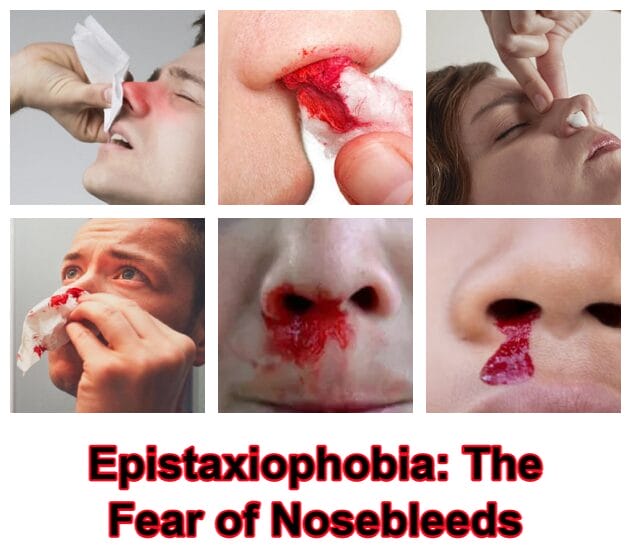Share This Article
Understanding Epistaxiophobia: The Fear of Nosebleeds
Most if not all of us, do not want to see blood coming from any part of our bodies. Some people however, experience extreme fear or high anxiety at the mere sight or notion of a nosebleed? If this is you and the fear is extreme or debilitating, you may be suffering from epistaxiophobia or the fear of nosebleads.
Although this may seem like a unique and very uncommon fear, the anxiety experienced by people who have developed this phobia can be very real. Let’s explore the nature of this phobia, its possible development, its symptoms, and management options.
What Exactly Is Epistaxiophobia?
Definition: Epistaxiophobia is an intense fear of nosebleeds. It’s derived from the Greek word ‘epistaxis’ (nosebleed) and ‘phobia’ (fear).
Overview: People with this phobia are not just slightly uncomfortable or squeamish about nosebleeds; they experience severe anxiety-fear even thinking about them.

How Does Epistaxiophobia Develop?
Most of us remember as a child being told to tilt your head back and don’t move for ten minutes and your nose will stop bleeding, for some this home remedy for stopping a nose bleed may not have sufficed. For some the nose bleed continued for much longer, imprinting a fear that can develop into an obsession.
Traumatic experience, like many phobias, epistaxiophobia often begins after a traumatic event related to nosebleeds. This could be a particularly distressful nosebleed that someone experienced during childhood or witnessed in another person, which left a lasting psychological impact. A nosebleed from a physical altercation or from hitting your nose accidentally hard enough to cause bleeding.
Learned behavior, for some this phobia may stem from observing someone else’s fear or negative reaction to nosebleeds, like a friend, parent or sibling.
Information overload, excessive exposure to medical information that depicts nosebleeds as something dangerous or potentially life-threatening can also plant a seed of irrational fear.
Whatever the reason for your obsession with nosebleeds, there are methods to limit this fears effect on your life, but first the symptoms.
Symptoms of Epistaxiophobia – Fear of Nosebleeds: Understanding Physical and Psychological Reactions
-
Physical Symptoms
- Panic Attacks: Rapid onset of symptoms such as a fast heartbeat, sweating, trembling, or feeling faint triggered by the thought or sight of a nosebleed.
- Avoidance: Deliberately avoiding activities that might cause nosebleeds, like sports or stepping out in cold or dry weather.
- Nausea: Experiencing nausea when a nosebleed occurs or is mentioned.
- Dizziness: Feeling lightheaded or fainting due to intense fear.
-
Psychological Symptoms
- Intense Fear or Dread: Severe anxiety or distress triggered merely by thinking about nosebleeds.
- Compulsive Behavior: Taking excessive precautions to prevent nosebleeds, such as constant moisturization of nasal passages or frequently checking for signs of bleeding.
- Social Withdrawal: Avoiding social scenarios where a nosebleed could potentially cause embarrassment.
Treatment Options for Epistaxiophobia: Self-Help and Professional Assistance
-
Self-Help Strategies:
- Education: Learn about the common causes and benign nature of most nosebleeds to demystify and reduce fear.
- Relaxation Techniques: Employ mindfulness, deep breathing exercises, or meditation to control anxiety symptoms.
- Gradual Exposure: Gradually expose oneself to the concept or mild simulations of nosebleeds to decrease sensitivity over time.
-
Professional Help:
- Cognitive Behavioral Therapy (CBT): Engage with a therapist to modify the thoughts and behaviors that fuel the phobia.
- Exposure Therapy: Systematically confront the fear through controlled exposure to nosebleeds, lessening the anxiety response.
- Medication: Consult with healthcare providers for medications like anti-anxiety or antidepressants to alleviate severe phobic symptoms.
- Talk Therapy: This may be the most effective and most convenient method. Talking with a trained professional, talking is a powerful tool for relief and growth.
In Conclusion
While the excessive fear of nosebleeds might not be one of the most talked-about phobias, it’s certainly a real and debilitating condition for those who have it. The good news is that with the right strategies and support, it is possible to overcome this phobia. Whether through self-help methods or with the guidance of a professional and talk therapy, those suffering from a fear of nosebleeds can find relief and regain a sense of normalcy in their lives.
Remember, the goal isn’t to never feel fear or anxiety again—that’s part of being human and an important tool for self-preservation—but to manage the anxiety and fear so it no longer controls your life. With patience and perseverance, epistaxiophobia can be managed effectively, paving the way for a freer, less fearful existence.



